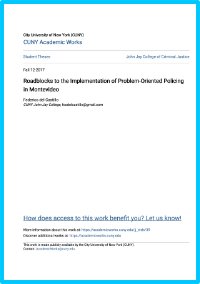By: Federico del Castillo
In the broad context of Uruguay’s police reform, the Ministry of Interior is implementing a pilot Problem-Oriented Policing (POP) program in Montevideo since late 2012. This research examined the obstacles confronted by the program throughout its implementation. Using a grounded theory approach, qualitative data was collected through 20 semi-structured interviews with members of the Uruguay National Police (UNP) of different ranks. Findings were analyzed based on the following categories: a) contextual factors; b) theoretical and practical inaccuracies; c) characteristics, skills and actions of project managers; d) resistance and motivational issues; e) resources; f) external support and cooperation. Consistent with research conducted on POP in other settings, findings suggest the program confronted a diverse set of obstacles over its implementation corresponding to all but one of the proposed categories. The study concludes with a series of recommendations to inform future POP endeavors by the UNP.
November 2017



